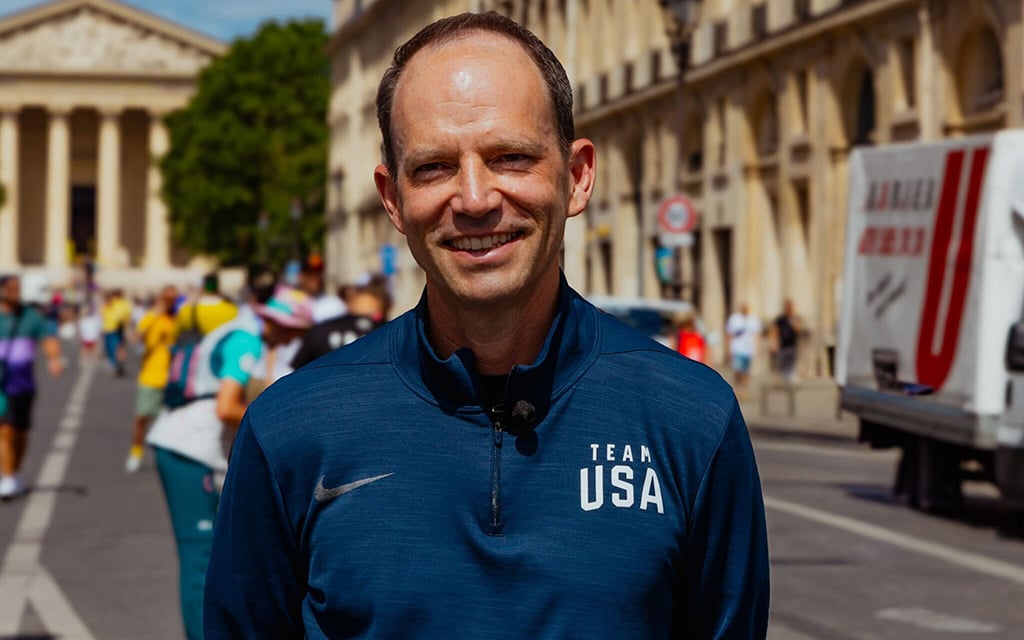
Rocky Harris, Chief of Sports and Athlete Services at the USOPC, reflects on his team at Arizona State outside the Place de la Concorde, the bustling venue for Olympic street sports events. (Photo by Savannah Bowie/Special for Cronkite News)
PARIS – Lost in the celebratory scene of the Team USA boat floating down the Seine – somewhere behind LeBron James doing his Washington crossing the Delaware impression – stood a misty-eyed Rocky Harris.
“I was getting really emotional over and over again that I couldn’t believe I’m there,” Harris said about his Paris Olympics opening ceremony experience.
Twenty five years ago, he was an Arizona State student contemplating what to do with his life. Today he is the Chief of Sport and Athlete Services with the United States Olympic & Paralympic Committee, second on the organizational chart behind CEO Sarah Hirshland and managing a staff of 300.
“My dad was a high school football and track coach. My mom was the Arizona Republic art director before becoming a professor,” he said. “So, I never imagined I’d be here representing Team USA on the world’s biggest stage.”
Yet here he is, where his journey reflects a strong passion for sports and a steadfast commitment to every athlete with whom he works.
His responsibilities include ensuring athletes’ mental and physical well-being is cared for during the Olympic and Paralympic games. He is also responsible for National Governing Body services, sports operations and collegiate partnerships.
“What we did is we took everything that interacts or touches the athlete and sports and put them all under one division,” Harris said.
By doing this, the USOPC eliminates any conflict between previous separate divisions and can allow holistic decisions for athletes versus decisions based on individual areas of expertise.
“For me, it’s not just about wins and losses but also about utilizing sports to do something more,” Harris said.
Harris is passionate about genuinely connecting with the athletes he works with and ensuring they are provided for and set up for success. It’s a skill set he refined during his days at ASU.
Harris worked in the athletic and marketing department at ASU while he was a student before he went on to professional sports, working in media relations for the San Francisco 49ers and Houston Texans. It wasn’t long before he returned to ASU as Chief Operating Officer.
During that time, Harris came across an athlete who was seriously injured while working as a bodyguard in Scottsdale after his athletic career at ASU. The athlete had an accomplished college career but was not set up for success following his time as an athlete.
“So we totally changed our thinking there and said we have to do more, and what I did is I applied that to the Olympic and Paralympic movement,” said Harris, who remains loyal to ASU and still uses @SunDevilRocky as his X handle.
He also worked as CEO of USA Triathlon before he started working for the USOPC two years ago.
“ASU was the building block for me that made me who I am,” Harris said.
A bond forged at ASU
Harris’ connection to Tempe ruin deep. ASU athletic director Graham Rossini, a friend and former colleague, reflected on him fondly.
“I’ve probably known Rocky since he came back to ASU from the MLS, around 2011 or 2012,” Rossini said. “We were always bonded in our love of the Sun Devils and similar experiences, both in and out of college sports and pro sports.”
Rossini applauded Harris’ passion, a quality that has significantly influenced his professional journey.
“I always appreciated his enthusiasm, just as an energetic guy. … He’s always been an enjoyable friend to be around and somebody that I’ve been able to look up to and count on for advice along the way.”
Doug Tammaro, senior associate athletic director at ASU, agreed, saying, “He’s just a fantastic person to be around. He’s always the smartest person in the room, but you would never get the feeling that he’s trying to prove that point.”
Harris’ contributions to ASU were not limited to his administrative responsibilities. He played a pivotal role in preserving and promoting the rich legacy of Sun Devil athletics. One of his achievements was navigating the transition of ASU baseball from Packard Stadium to Phoenix Municipal Stadium.
Rossini praised Harris’ dedication to that program.
“He was the leading figure in getting all the branding of the national championships and the retired numbers and the College World Series appearances represented,” said Rossini, emphasizing Harris’ care for the ASU community.
Transition to a global stage
Harris’ transition from ASU to USOPC has been a significant step in his career, showcasing his ability to operate at the highest sports management levels.
“It’s pretty neat,” Rossini said about Harris’ success. “I’m not surprised that he’s having the kind of success he is with the United States Olympic Committee.”
This achievement highlights Harris’ capabilities and could inspire ASU students and alums, illustrating the pathways available through leveraging the ASU network.
“Rocky Harris doesn’t need to be the flag bearer or to lead the flag bearers to be the most caring person in the room,” Tammaro said. “He would be that person if he were at the end of that line, but it was cool to see him leading LeBron James and Coco Gauff. You know, that’s a Sun Devil up there.”
Harris remains proud of his Sun Devil roots – carrying the values and lessons learned at ASU into international sports.
“He didn’t get to that spot by just showing up,” Tammaro said.